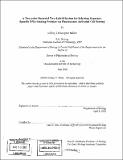| dc.contributor.advisor | Carl O. Pabo. | en_US |
| dc.contributor.author | Miller, Jeffrey Christopher, 1974- | en_US |
| dc.contributor.other | Massachusetts Institute of Technology. Dept. of Biology. | en_US |
| dc.date.accessioned | 2005-08-23T19:46:22Z | |
| dc.date.available | 2005-08-23T19:46:22Z | |
| dc.date.copyright | 2002 | en_US |
| dc.date.issued | 2002 | en_US |
| dc.identifier.uri | http://hdl.handle.net/1721.1/8388 | |
| dc.description | Thesis (Ph.D.)--Massachusetts Institute of Technology, Dept. of Biology, 2002. | en_US |
| dc.description | Vita. | en_US |
| dc.description | Includes bibliographical references. | en_US |
| dc.description.abstract | Proteins that recognize specific DNA sequences play a major role in many biological processes, and the ability to select or design novel DNA binding proteins could have a major impact on many areas of biotechnology and medicine. This thesis begins with background information on zinc finger DNA-binding proteins and on methods to select these proteins, and how they can be used to regulate endogenous human genes. Next, I describe a structural and biochemical study of a DNA-binding protein which demonstrates some of the complexities of the protein-DNA interface, and which highlights difficulties for designing sequence-specific proteins via a simple code. I then develop an experimental system (starting with a pre-existing bacterial two-hybrid selection system) which allows the selection of proteins based on their preference of one DNA site over another. I use this system to attempt to attenuate the affinity of a zinc finger protein without destroying its specificity. Finally, I describe an experiment in which I select a new domain that adds sequence specificity to a pre-existing protein from a library of completely random peptides. | en_US |
| dc.description.statementofresponsibility | by Jeffrey Christopher Miller. | en_US |
| dc.format.extent | 257 leaves | en_US |
| dc.format.extent | 13917117 bytes | |
| dc.format.extent | 13916876 bytes | |
| dc.format.mimetype | application/pdf | |
| dc.format.mimetype | application/pdf | |
| dc.language.iso | eng | en_US |
| dc.publisher | Massachusetts Institute of Technology | en_US |
| dc.rights | M.I.T. theses are protected by copyright. They may be viewed from this source for any purpose, but reproduction or distribution in any format is prohibited without written permission. See provided URL for inquiries about permission. | en_US |
| dc.rights.uri | http://dspace.mit.edu/handle/1721.1/7582 | |
| dc.subject | Biology. | en_US |
| dc.title | A two-color bacterial two-hybrid system for selecting sequence-specific DNA-binding proteins via fluorescence activated cell sorting | en_US |
| dc.title.alternative | 2-color bacterial 2-hybrid system for selecting sequence-specific deoxyribonucleic acid-binding proteins via fluorescence activated cell sorting | en_US |
| dc.type | Thesis | en_US |
| dc.description.degree | Ph.D. | en_US |
| dc.contributor.department | Massachusetts Institute of Technology. Department of Biology | |
| dc.identifier.oclc | 50575514 | en_US |
